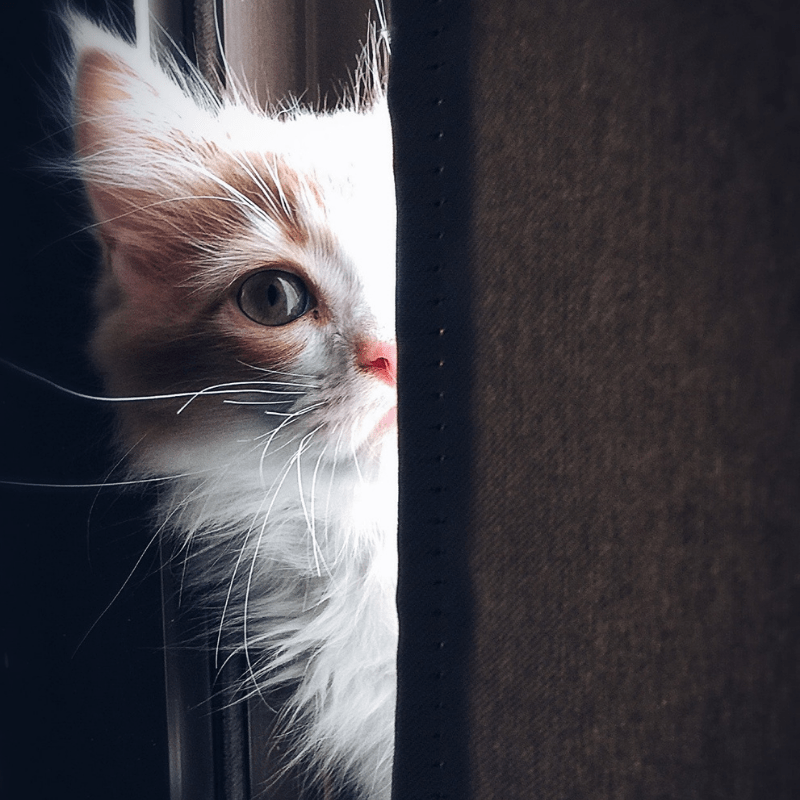Special Note! This site contains affiliate links. If you click a link AND make a purchase we MAY make a small commission. The process costs you nothing. It is just how the company spends its advertising dollars.
My Cat Won’t Leave Me Alone
Most cat owners love cuddling with their fluffy and soft cat time from time. The cat might follow you around the house, in bed, or on the couch occasionally to cuddle with you. However, you might start feeling irritated if your cat starts to follow you without giving you a break. If your cat has all of a sudden started acting clingier than usual, you may assume the behavior as weird and lack to give it a more profound thought. However, a sudden cause of the behavior is a cause of concern so is an overly clingy cat. Here is an exclusive look at some of the common reasons your cat has become clingy and what you can do to collect the behavior.

Why My Cat Won’t Leave Me Alone?
Cats are popular for being self-sufficient, independent, and often dismissive to humans. So if your cat will not leave you alone, it might mean that something is wrong. Some of the reasons your cat is becoming clingy include;
- New to the environment
If you just moved to a new environment or the cat is new to you, it might take some time for the cat to adapt to the new environs. New smells, people, and surroundings can cause your cat to feel overwhelmed and draw them closer to you for comfort. Most people inquiring about ‘my cat won’t leave me alone,’ are new to their area.
- They were rescued
Cats that have been rescued may get clingy behavior. The apparent reason might be because the cat experienced a difficult time in the past. They might have the fear that they will get abandoned or mistreated again.
- It’s Hungry
Similar to kids or dogs, cats will often signal that they are hungry. Excessive meow-ing and clinginess can simply signify your kitty is hungry. As long as the cat has a healthy weight, you should be okay to increase the food you are giving the cat. But if the cat seems unhealthy, you can seek nutritional planning for your cat.
- Anxiety
If your cat is feeling insecure or vulnerable, they might become clingier or more affectionate to you. This often occurs in the cases of rescue cats separated from their mothers when they were young. Most kittens that were separated from their mother too early get long-term separation anxiety. They hence try to spend a lot of time around you, their new mom, for fear that you would abandon them without warning. This leads to clingy behavior. You can stroke your cat gently to calm it and reassure them of its trust in you.
- Underlying health problem
An illness or injury might trigger an immediate behavior change. Because you know your cat’s usual behavior, check your cat for outward signs and tell the veterinarian of any signs that worry you.
- Lack of proper training and guidance
You might have reinforced some of the needy and clingy behaviors by cuddling or petting your cat. Similarly, you may have adopted an adult cat in which particular behaviors have already been embedded. If the behavior was often reinforced, the cat might see it as a usual way to get a treat and attention. Fortunately, you can enforce various training techniques to curb this behavior.

What Do You Do When Your Cat Won’t Leave You Alone?
- Give your cat a silent treatment.
It is essential to give attention to your beloved animal, but too much attention to your cat might cause the cat to develop clingy behaviors. You want to ensure you are spending sufficient time with your cat daily to make them feel loved, but beyond that, you should tell them no and avoid overstimulation. If your cat doesn’t leave you alone, you should give them a silent treatment, avoid making eye contact with your cat and ignore them. With time, when your cat does not get a warm response from you, they will start being independent.
- Get another pet
If your cat won’t leave you alone, it might be because they are feeling extra needy. While this won’t be a solution for every cat, your cat might stop being clingy if you bring another pet home. Be it an adult cat, a kitten, or another animal pet, most cats enjoy having a companion at home with them. Although they might need an adjustment period, bringing another pet home offers your cat someone else to play with, which will help take off some pressure for the cat to always be clingy.
- Set a routine schedule
In most cases, if you set fixed routines and stick to them, your cat will fit into the routine gradually. Most cat owners have solved the cases of a clingy cat by putting together a routine schedule. You should set out the specific time to cuddle the kitty, but as soon as the playtime is over, you should quickly move to the next task without any reluctance.
- Teach the cat some manners
Cats often do what they want irrespective of what you think, but you can train them from stopping to bother you constantly. If your cat is clingy, you should teach it that there are times you don’t want to be bothered. For instance, most cats love resting and sitting on warm appliances such as laptops, often getting in your way. As such instances, you should scold the cat and go on to remove the cat from your way. Continuously do this until the cat knows to obey your wish.
- Avoid giving in easily
This seems much easier on paper, but in reality, most people give in when their cats begin to meow mournfully and rub on you. Although it might sound a bit harsh, you are required to give your cat a cold-shoulder treatment. Cuddling the cat occasionally is good, but you should avoid giving in to your cat’s devious behaviors.
Conclusion
We hope you now understand the possible reason why your cat won’t leave you alone and possible solutions. In most cases, patience is essential, and it needs a great deal of effort and time to rectify the dependent and clingy tendency of your cat properly. It is hence important not to lose your patience or rush the training process to correct the behavior. But your cat might continue with the clingy behavior even after following the tips reviewed above. In this case, you can consult a veterinarian for advice or anti-anxiety medication as a last option.
You May Also Like:





